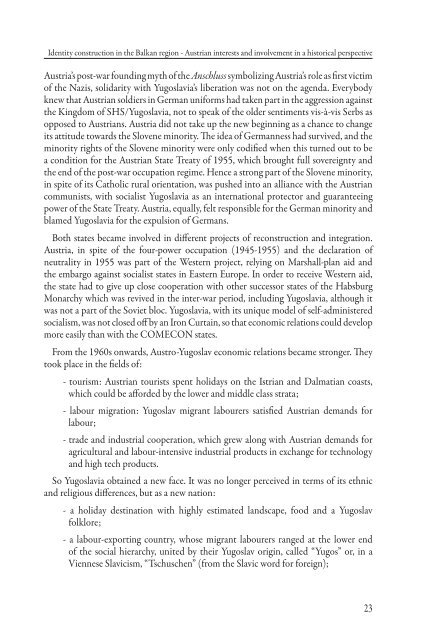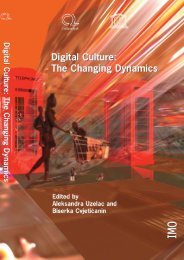free download in pdf format - Culturelink Network
free download in pdf format - Culturelink Network
free download in pdf format - Culturelink Network
You also want an ePaper? Increase the reach of your titles
YUMPU automatically turns print PDFs into web optimized ePapers that Google loves.
Identity construction <strong>in</strong> the Balkan region - Austrian <strong>in</strong>terests and <strong>in</strong>volvement <strong>in</strong> a historical perspective<br />
Austria’s post-war found<strong>in</strong>g myth of the Anschluss symboliz<strong>in</strong>g Austria’s role as fi rst victim<br />
of the Nazis, solidarity with Yugoslavia’s liberation was not on the agenda. Everybody<br />
knew that Austrian soldiers <strong>in</strong> German uniforms had taken part <strong>in</strong> the aggression aga<strong>in</strong>st<br />
the K<strong>in</strong>gdom of SHS/Yugoslavia, not to speak of the older sentiments vis-à-vis Serbs as<br />
opposed to Austrians. Austria did not take up the new beg<strong>in</strong>n<strong>in</strong>g as a chance to change<br />
its attitude towards the Slovene m<strong>in</strong>ority. Th e idea of Germanness had survived, and the<br />
m<strong>in</strong>ority rights of the Slovene m<strong>in</strong>ority were only codifi ed when this turned out to be<br />
a condition for the Austrian State Treaty of 1955, which brought full sovereignty and<br />
the end of the post-war occupation regime. Hence a strong part of the Slovene m<strong>in</strong>ority,<br />
<strong>in</strong> spite of its Catholic rural orientation, was pushed <strong>in</strong>to an alliance with the Austrian<br />
communists, with socialist Yugoslavia as an <strong>in</strong>ternational protector and guarantee<strong>in</strong>g<br />
power of the State Treaty. Austria, equally, felt responsible for the German m<strong>in</strong>ority and<br />
blamed Yugoslavia for the expulsion of Germans.<br />
Both states became <strong>in</strong>volved <strong>in</strong> diff erent projects of reconstruction and <strong>in</strong>tegration.<br />
Austria, <strong>in</strong> spite of the four-power occupation (1945-1955) and the declaration of<br />
neutrality <strong>in</strong> 1955 was part of the Western project, rely<strong>in</strong>g on Marshall-plan aid and<br />
the embargo aga<strong>in</strong>st socialist states <strong>in</strong> Eastern Europe. In order to receive Western aid,<br />
the state had to give up close cooperation with other successor states of the Habsburg<br />
Monarchy which was revived <strong>in</strong> the <strong>in</strong>ter-war period, <strong>in</strong>clud<strong>in</strong>g Yugoslavia, although it<br />
was not a part of the Soviet bloc. Yugoslavia, with its unique model of self-adm<strong>in</strong>istered<br />
socialism, was not closed off by an Iron Curta<strong>in</strong>, so that economic relations could develop<br />
more easily than with the COMECON states.<br />
From the 1960s onwards, Austro-Yugoslav economic relations became stronger. Th ey<br />
took place <strong>in</strong> the fi elds of:<br />
- tourism: Austrian tourists spent holidays on the Istrian and Dalmatian coasts,<br />
which could be aff orded by the lower and middle class strata;<br />
- labour migration: Yugoslav migrant labourers satisfi ed Austrian demands for<br />
labour;<br />
- trade and <strong>in</strong>dustrial cooperation, which grew along with Austrian demands for<br />
agricultural and labour-<strong>in</strong>tensive <strong>in</strong>dustrial products <strong>in</strong> exchange for technology<br />
and high tech products.<br />
So Yugoslavia obta<strong>in</strong>ed a new face. It was no longer perceived <strong>in</strong> terms of its ethnic<br />
and religious diff erences, but as a new nation:<br />
- a holiday dest<strong>in</strong>ation with highly estimated landscape, food and a Yugoslav<br />
folklore;<br />
- a labour-export<strong>in</strong>g country, whose migrant labourers ranged at the lower end<br />
of the social hierarchy, united by their Yugoslav orig<strong>in</strong>, called “Yugos” or, <strong>in</strong> a<br />
Viennese Slavicism, “Tschuschen” (from the Slavic word for foreign);<br />
23



